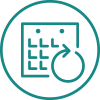

POCT HIV


POCT HIV
Purpose:
Human immunodeficiency virus (HIV) is a retrovirus that preferentially infects and destroys cells of the immune system, in particular the CD4 cells (a class of T cells). Although significant progress has been made in the UK to reduce the incidence of HIV, there is a clear ambition to eliminate the viral transmission through the testing of all undiagnosed HIV and commencement of antiretrovirals (ARVs). A number of guidelines have been produced over the last few years including NICE guideline [NG60], 2016 and the British HIV Association (BHIVA)/British Association for Sexual Health and HIV (BASHH)/British Infection Association adult HIV testing guidelines 2020 to encourage testing including the Pre-exposure prophylaxis (PreEP) HIV prevention strategy.
Recommendations include testing groups at increased risk of exposure; HIV opt-out testing for people attending sexual health services, addiction and substance misuse services, antenatal, termination of pregnancy, services for hepatitis B and C, TB and lymphoma and patients commencing chemotherapy or immunosuppressive therapy; people presenting with symptoms; patients accessing primary and secondary healthcare in areas of high seroprevalence including emergency departments; sexual partners of those diagnosed with HIV.
They also recommend that rapid community testing including Point of Care testing (POCT) increases testing rates in at-risk groups and should be commissioned as part of local HIV testing programmes.
Pre-exposure prophylaxis (PrEP) is a HIV prevention strategy in which HIV-negative people use HIV (ARVs), drugs usually used to treat HIV infection, to reduce their risk of becoming infected with HIV. This service is available in the UK through the NHS sexual health clinics and requires HIV testing prior to receiving ARVs to confirm negative status. POCT HIV rapid testing, both 3rd and 4th generation are now widely available in the UK.
Scope:
The Weqas POCT HIV Programme was specifically developed for 4th generation assays; to assess the user’s ability to correctly identify both HIV Antibodies and Ag, and assess the diagnostic accuracy of the methods using samples mimicking the different clinical presentations. HIV-1 p24 antigens are found on the surface of HIV cells approximately 12 to 26 days after exposure and before HIV antibodies are produced, allowing for earlier detection of the virus.
The sample matrix is ‘off the clot’ human serum tested negative for HIV, Hepatitis B and C at donor level which is spiked with a non-infective source of recombinant HIV markers (p24 Ag, HIV-1 Ab and HIV-2 Ab) at varying concentrations. Three samples are distributed bimonthly.
Performance Assessment The programme is designed to assess both user and method performance, including limit of detection, sensitivity and specificity. The scores broadly reflect clinical importance, where a correct result (in agreement with interpretive comment) is given a score of 0. A score of 3 or 4 is assigned for incorrectly identified results, where 4 represents a gross misclassification of the result. A negative result for a positive sample is given a score of 3 to 4 depending on the concentration of the positive sample. A positive result for a negative sample is given a score of 3.
 |
Key Features:
|
| HIV Programme | ||
|---|---|---|
| Analyte | Approx. Range Covered | |
| p24 Antigen | Negative / Positive | |
| HIV-1 Antibody | Negative / Positive | |
| HIV-2 Antibody | Negative / Positive | |
Related Documents








